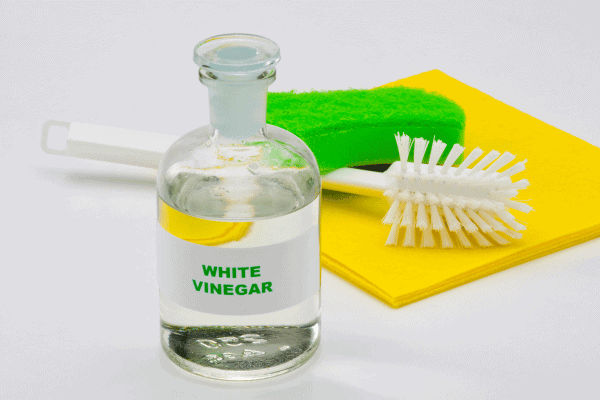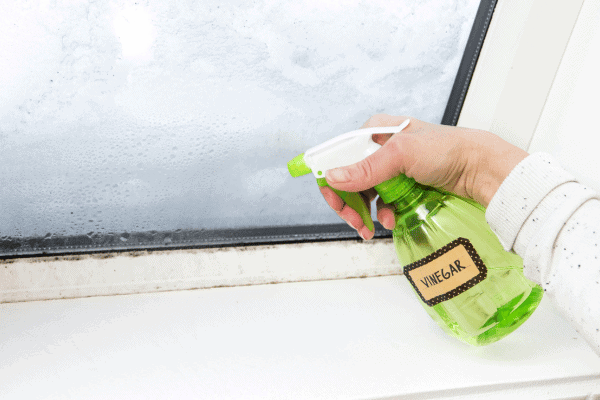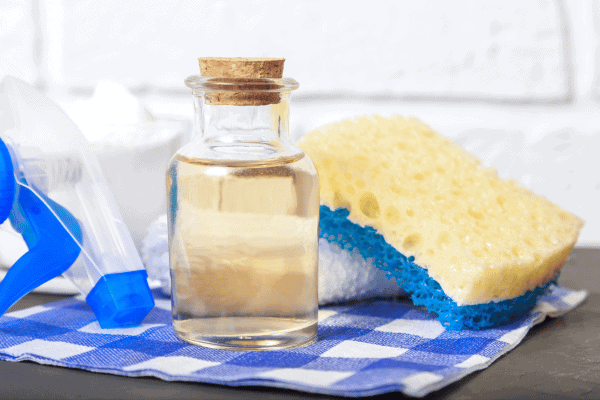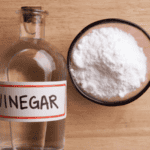Vinegar is a staple in many households—not just for cooking but also for cleaning. As a natural disinfectant, it cuts through grease, mold, and bacteria, making it a go-to ingredient for DIY cleaners. But not all vinegar is the same when it comes to household cleaning.
From apple cider vinegar to balsamic vinegar, there are several types, each with unique properties. However, when it comes to cleaning, white vinegar and cleaning vinegar are the most commonly used. The difference between these two isn’t just about strength—it also affects how and where they should be used.
So, which one should you use for stainless steel appliances, tile floors, or laundry? And is it safe to consume cleaning vinegar? Let’s break it all down so you can make the right choice for your home.
What Is White Vinegar?

White vinegar, also known as distilled vinegar or spirit vinegar, is a clear, colorless liquid widely used in both cooking and cleaning. It consists of approximately 5% acetic acid and 95% water, making it safe for consumption while still effective for household cleaning.
Common Uses of White Vinegar
- Culinary Applications – White vinegar is a kitchen essential, commonly used in salad dressings, marinades, pickling, and sauces. It enhances flavors, acts as a natural preservative, and is even used in baking to activate baking soda.
- Household Cleaning – Thanks to its mild acidity, white vinegar is a popular ingredient in DIY cleaning solutions. It helps remove soap scum, dissolve mineral deposits, and eliminate odors from household items like coffee makers, countertops, and tile floors.
What Is Cleaning Vinegar?
Cleaning vinegar is a more potent version of white vinegar, specially formulated for household cleaning purposes. While it looks similar, its higher acidity gives it stronger cleaning power, making it more effective at tackling stubborn grime, soap scum, and mineral buildup.
Composition and Strength
Unlike standard white vinegar, which contains 5% acetic acid, cleaning vinegar typically has 6% acetic acid and 94% water. While a 1% difference may seem minor, it actually makes cleaning vinegar 20% stronger than its culinary counterpart.
This higher concentration allows it to break down dirt and grease and even kill weeds more effectively than diluted cleaning vinegar or traditional household cleaning agents.
Not for Consumption
Despite its similarities to white vinegar, cleaning vinegar is not safe for cooking. It is not produced or tested to meet food-quality standards, meaning it may contain impurities that aren’t suitable for the human body.
Ingesting cleaning vinegar can be harmful due to its higher acidity and potential chemical residues. If you need vinegar for salad dressings, marinades, or pickling, stick to white distilled vinegar or apple cider vinegar—never consume cleaning vinegar.
Because of its strong fumes and higher concentration, it’s best to use cleaning vinegar in well-ventilated areas and avoid mixing it with chlorine bleach, which can produce toxic fumes.
Cleaning Vinegar vs. White Vinegar: Key Differences for Cleaning

When choosing between cleaning vinegar and white vinegar, it’s important to consider their strength, effectiveness, and best use cases. While both can be used for household cleaning, their differences in acidity levels and safety determine where each works best.
Side-by-Side Comparison
| Feature | Cleaning Vinegar | White Vinegar |
|---|---|---|
| Acidity Level | 6% acetic acid, 94% water | 5% acetic acid, 95% water |
| Cleaning Strength | 20% stronger than white vinegar, making it more effective for tough stains, mineral deposits, and heavy grease | Works well for general light cleaning, deodorizing, and surface wiping |
| Best Uses | Deep cleaning kitchens, bathrooms, and areas with grime buildup. Effective for removing soap scum, mold, and limescale | Ideal for light cleaning on countertops, appliances, and glass surfaces |
| Effectiveness on Tough Stains | Quickly dissolves hard water stains, mineral deposits, and grease | Can remove stains but may require multiple applications or scrubbing |
| Odor | Stronger smell due to higher acidity | Mild scent dissipates faster |
| Safety on Surfaces | Can be too harsh for natural stone, hardwood floors, rubber seals, and delicate finishes | Safer for everyday cleaning but still not recommended for natural stone and certain surfaces |
Where Does Each Vinegar Work Best?
Cleaning vinegar is the go-to choice for deep cleaning tasks that require a more powerful solution. In bathrooms, it effectively removes soap scum from shower doors and hard water stains from sinks and toilets, cutting through mineral deposits that regular white vinegar may struggle to break down.
In kitchens, its higher acidity makes it an excellent degreaser, breaking down built-up grime on stovetops, range hoods, and ovens. It’s also commonly used for descaling coffee makers and kettles, helping to eliminate mineral buildup that affects appliance performance.
On the other hand, white vinegar is better suited for everyday cleaning and deodorizing. It’s a great option for wiping down countertops, glass surfaces, and appliances, providing a mild yet effective clean without leaving behind a strong odor.
White vinegar is also widely used as a natural deodorizer, helping to neutralize unpleasant smells in refrigerators, trash cans, and fabric. Additionally, it can be used in laundry as a fabric softener alternative, helping to remove detergent buildup while leaving clothes feeling fresh and soft.
Safety Warnings: Where Not to Use Vinegar
- Natural Stone (Granite, Marble, Quartz): The acidity can etch and damage the surface.
- Hardwood Floors: Prolonged exposure can strip the finish and cause dullness.
- Rubber Seals & Gaskets: Cleaning vinegar may deteriorate rubber parts in appliances like dishwashers and washing machines.
- Metal Surfaces (Cast Iron, Aluminum, Copper): Vinegar can cause corrosion over time
How to Store Cleaning and White Vinegar: Safety Tips
Proper storage of cleaning vinegar and white vinegar ensures their effectiveness, safety, and longevity. While vinegar is a natural ingredient that doesn’t expire, improper storage can reduce its potency and even lead to hazardous situations.
Follow these simple tips to keep your own vinegar solution safe and effective for cleaning purposes and food use.
Best Practices for Storing Vinegar

Use the Right Storage Containers
- Keep vinegar in its original plastic or glass bottle with a tight-sealing cap to prevent evaporation and spills.
- Avoid metal containers (especially aluminum, copper, or cast iron), as the acetic acid in vinegar can cause corrosion over time.
Choose the Right Storage Location
- Store vinegar in a cool, dark place, away from direct sunlight and heat sources, which can weaken its cleaning power.
- Good storage spots: Kitchen cabinets, pantry shelves, or a laundry room.
- Avoid storing near stoves, radiators, or windows where heat and light can alter its composition.
Keep It Away from Other Chemicals
- Never store vinegar near bleach or ammonia. Mixing vinegar with bleach creates toxic chlorine gas, while combining it with ammonia forms harmful fumes.
- Keep vinegar separate from strong chemical-based cleaning supplies to prevent accidental mixing.
Label Clearly to Prevent Confusion
- If you transfer vinegar to a different container, label it properly to distinguish between cleaning vinegar and food-grade white vinegar.
- Example: “Cleaning Vinegar – For Household Use Only” vs. “White Vinegar – Safe for Cooking.”
Child & Pet Safety
- Store cleaning vinegar out of reach of children and pets, as its higher concentration can be harmful if ingested.
- If necessary, place it in a locked cabinet or a high shelf to prevent accidents.
Shelf Life & Avoiding Contamination
- Vinegar does not expire, but improper storage can make it less effective over time.
- Keep it sealed to prevent evaporation and contamination.
- Avoid cross-contaminating vinegar by never dipping a spoon or cloth that has touched raw meat, cleaning products, or other liquids into the bottle.
Common Storage Mistakes to Avoid
❌ Storing in Metal Containers – Can cause rusting and corrosion. Stick to glass or plastic.
❌ Leaving the Cap Loose – Leads to evaporation, making the vinegar less effective.
❌ Keeping It Near Bleach or Ammonia – Increases the risk of dangerous chemical reactions.
❌ Not Labeling Properly – Confusing cleaning vinegar with cooking vinegar could lead to accidental ingestion.
Reach Out to Atlanta Maids for Your Cleaning Needs
Keeping your home spotless takes time and effort, but with Atlanta Maids, you don’t have to do it alone. We offer professional house cleaning and maid services in Atlanta, ensuring that your home stays fresh, tidy, and welcoming without the hassle.
Our team specializes in top-notch cleaning solutions, tailored to fit your specific needs. Whether you need a one-time deep clean, recurring housekeeping, or move-in/move-out cleaning, we have the expertise and high-quality cleaning supplies to deliver exceptional results.
Why Choose Atlanta Maids?
- Personalized cleaning plans to match your home’s unique requirements.
- Experienced and trusted professionals dedicated to top-tier service.
- Eco-friendly cleaning options available upon request.
- Easy online booking for a seamless experience.
Scheduling your cleaning service is quick and hassle-free! Simply visit our booking page or call us at (404) 905-5141 to book your appointment today. Experience the convenience of a professionally cleaned home with Atlanta Maids!
FAQs
Is cleaning vinegar the same as white vinegar for cleaning?
No, cleaning vinegar contains 6% acetic acid, making it 20% stronger than white vinegar, which has 5% acetic acid. While both can be used for household cleaning, cleaning vinegar is stronger and more effective for stubborn stains and heavy grime, while white vinegar is better for everyday surface cleaning.
When not to use cleaning vinegar?
Avoid using cleaning vinegar on natural stone (granite, marble, quartz), hardwood floors, rubber gaskets, aluminum, cast iron, and electronic screens. Its higher acidity can damage finishes, corrode metals, and degrade rubber seals over time.
Can I use cleaning vinegar in my washing machine?
Yes, but with caution. Cleaning vinegar can help remove detergent buildup and odors, but excessive use may weaken rubber seals and hoses. To prevent damage, use it sparingly and dilute with water before running a rinse cycle.
Do you have to rinse after cleaning with vinegar?
It depends on the surface. For glass, countertops, and most non-porous surfaces, rinsing isn’t necessary. However, for areas like tile floors, kitchen appliances, and surfaces that come into contact with food, wiping with warm water helps remove any lingering vinegar residue and odor.

